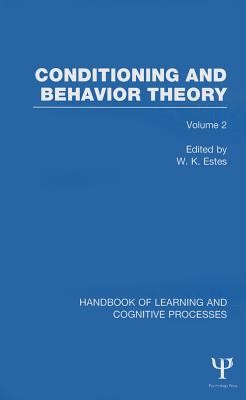
- We will send in 10–14 business days.
- Publisher: Psychology Press
- ISBN-10: 1848723903
- ISBN-13: 9781848723900
- Format: 15.8 x 23.6 x 2.5 cm, hardcover
- Language: English
- SAVE -10% with code: EXTRA
Handbook of Learning and Cognitive Processes, Volume 2 (e-book) (used book) | bookbook.eu
Reviews
Description
Originally published in 1975, Volume 2 of this Handbook looks at areas traditionally associated with learning theory such as conditioning, discrimination and behavior theory. It deals with concepts and theories growing principally out of laboratory studies of conditioning and learning. The intention was to treat mechanisms, processes, and principles of some generality - applicable at least to all vertebrates. It was becoming well understood that detailed interpretations of particular behaviors required the authors to take account of the way general principles operate in the context of species-specific behavioral organizations and developmental histories; but detailed consideration of just how these interpretations were accomplished for different animal forms was another enterprise. Here the authors limit their task to abstracting from the enormous literature facts and ideas which seemed general enough to be of interest and perhaps utility to investigators in other disciplines at the time.
Volume 1 presented an overview of the field and introduced the principal theoretical and methodological issues that persistently recurred in the expanded treatments of specific research areas that comprise the later volumes. Volume 3 looks at human learning and motivation, while the last 3 volumes range over the many active lines of research identified with human cognitive processes at the time.
EXTRA 10 % discount with code: EXTRA
The promotion ends in 20d.15:32:47
The discount code is valid when purchasing from 10 €. Discounts do not stack.
- Publisher: Psychology Press
- ISBN-10: 1848723903
- ISBN-13: 9781848723900
- Format: 15.8 x 23.6 x 2.5 cm, hardcover
- Language: English English
Originally published in 1975, Volume 2 of this Handbook looks at areas traditionally associated with learning theory such as conditioning, discrimination and behavior theory. It deals with concepts and theories growing principally out of laboratory studies of conditioning and learning. The intention was to treat mechanisms, processes, and principles of some generality - applicable at least to all vertebrates. It was becoming well understood that detailed interpretations of particular behaviors required the authors to take account of the way general principles operate in the context of species-specific behavioral organizations and developmental histories; but detailed consideration of just how these interpretations were accomplished for different animal forms was another enterprise. Here the authors limit their task to abstracting from the enormous literature facts and ideas which seemed general enough to be of interest and perhaps utility to investigators in other disciplines at the time.
Volume 1 presented an overview of the field and introduced the principal theoretical and methodological issues that persistently recurred in the expanded treatments of specific research areas that comprise the later volumes. Volume 3 looks at human learning and motivation, while the last 3 volumes range over the many active lines of research identified with human cognitive processes at the time.


Reviews